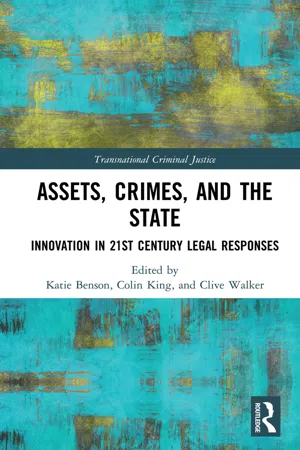
Assets, Crimes and the State
Innovation in 21st Century Legal Responses
Katie Benson,Colin King,Clive Walker
- 282 Seiten
- English
- ePUB (handyfreundlich)
- Über iOS und Android verfügbar
Assets, Crimes and the State
Innovation in 21st Century Legal Responses
Katie Benson,Colin King,Clive Walker
Über dieses Buch
Organised crime, corruption, and terrorism are considered to pose significant and unrelenting threats to the integrity, security, and stability of contemporary societies. Alongside traditional criminal enforcement responses, strategies focused on following the money trail of such crimes have become increasingly prevalent. These strategies include anti-money laundering measures to prevent 'dirty money' from infiltrating the legitimate economy, proceeds of crime powers to target the accumulated assets derived from crime, and counter-terrorist financing measures to prevent 'clean' money from being used for terrorist purposes.
This collection brings together 17 emerging researchers in the fields of anti-money laundering, proceeds of crime, counter-terrorist financing and corruption to offer critical analyses of contemporary anti-assets strategies and state responses to a range of financial crimes. The chapters focus on innovative anti-financial crime measures and assemblages of governance that have become a feature of late modernity and on the ways in which individual nation states have responded to anti-money laundering and counter-terrorist financing requirements in light of their specific social, political, and economic contexts. This collection draws on perspectives from law, criminology, sociology, politics, and other disciplines. It adopts a much-needed international approach, focusing not only on expected jurisdictions, such as the United States and United Kingdom, but also on analysis from countries such as Qatar, Kuwait, Iran, and Nigeria. The authors stand out for their fresh and original research, which places them at the cutting edge of the subject.
This book provides a comprehensive, insightful, and original study of an important and developing field for academics, students, practitioners, and policymakers in multiple jurisdictions.